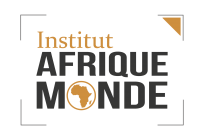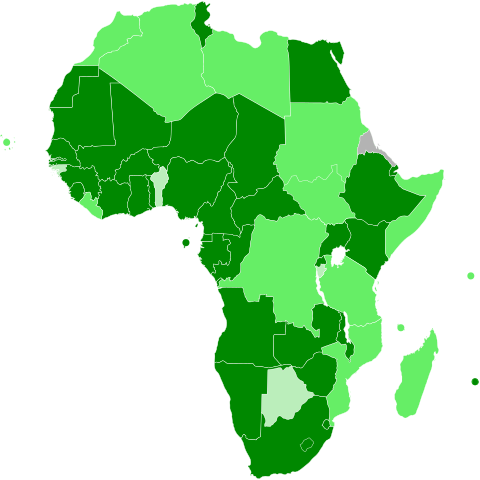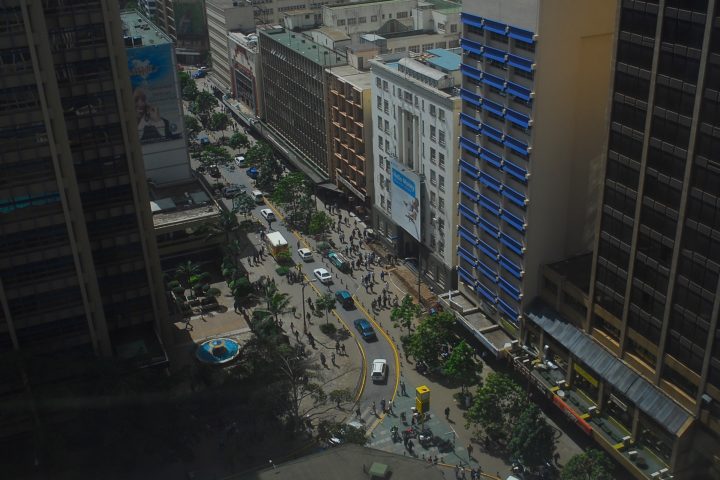Inventing Tomorrow’s Ideas
The construction of the African Union is shaping today – the history of an entire continent, the lives of hundreds of millions of African citizens and Africa’s role in the world. Africa, once seen as a poor continent and economically dependent on other regions, has relatively quickly proved the opposite by recording good economic growth over the past decade. With an average economic growth rate of around 5% per year during the decade 2001-2010, Africa has emerged as a significant growth driver in the world, following China. This optimism is based on its growing, dynamic, resourceful and young population, acquiring the skills that will be needed to drive Africa’s transformation.
Despite this average annual GDP growth, the major challenge is to increase wealth with multidimensional poverty reduction, i.e. inclusive development. As ECA points out in its 2013 report, this growth has not translated into economic diversification or significant job creation, let alone broad social development. In short, it corroborates the chaotic trajectory of African development. Indeed, although the continent has made progress towards the Millennium Development Goals, Africa will probably be the only region not to achieve them by 2015. Projections of current developments suggest that global poverty will become much more of an African rather than an Asian problem.
In the context of globalization, new cooperation actors have emerged in Africa and are emerging as potential competitors of the continent’s former trading partners. With its abundant natural resources and a market of more than a billion consumers, Africa has become a strategic trading partner for many countries. The arrival of a new group of emerging and newly industrialized economic actors is one of the most remarkable phenomena in recent economic history. These “South-South” relationships introduce a wide range of new products, capital and commercial goods, technologies, expertise, development models and experiences.
While traditional partners continue to play an important role in Foreign Direct Investment (FDI) and Official Development Assistance (ODA), non-OECD countries are increasingly involved in cooperative partnerships with Africa. On the one hand, the developed countries, mainly the European Union and the United States, are losing ground and are trying to win back the African market, which offers real commercial opportunities. On the other hand, emerging countries are seeking to conquer this market in their own way, using different approaches. What does this diversification of the continent’s economic partners promise ? What economic partnerships will Africa build with traditional Western partners (EPA, AGOA, etc.) and its new emerging partners, while the new regionalism now advocated by the African Union aims to intensify regional integration to face the dangers of globalization ?
This portrait is at the root of a growing questioning of the continent’s development choices. At the beginning of the new millennium, the creation of NEPAD and the AU demonstrated the determination of African countries to assume primary responsibility for the continent’s future, and an awareness of the mistakes of the past. Over the next decade, Africa and the international community have seen, and continue to see, the evolution and transformation of the continent’s institutional architecture progressing at a rapid pace and placing the continent on a new path of sustainable economic growth and political reform. The key question is therefore how to transform Africa’s potential into strong, sustained and shared growth and make tangible improvements in people’s living conditions. In other words, will Africa be able to meet this challenge? Will this economic growth be based on sustainable technical, technological and industrial foundations that can transform demographic and social challenges into opportunities ?
Peace and security are necessary conditions for private sector development and trade expansion in Africa. They have important consequences for investment and entrepreneurship. They also have a significant impact on country risk premiums for borrowing and thus on access to finance for intra-African trade.
The threats of destabilization in sub-Saharan Africa encompass a broad spectrum of factors including: economic and social factors (poverty and inequality), political factors related to the way people access power. To these recurring factors should be added maritime piracy. Safety at sea, which traditionally falls within the sovereign functions of the State, is particularly difficult to implement in maritime space. This phenomenon is compounded by the problem of the international response to states designated as “failed”, all against the backdrop of growing terrorism, environmental scandal and competition for fisheries resources (Somali pirates sometimes claim that it is industrial overfishing near their coasts that deprives them of livelihoods and drives them into crime. Global warming and the resulting climate change is the most global challenge that questions the very survival of the planet. Do Africa’s development strategies and current trajectory integrate these multidimensional and crucial issues for its future, its survival and that of the planet ?
The focus of our questions is as follows: is economic openness likely to reduce the deficits accumulated by the countries of the region in economic matters (their inability to create wealth commensurate with the needs of the population), in social matters (deficiencies in human development), in environmental matters (the degradation of nature and the squandering of resources by uncontrolled industrialization)? How can Africa take charge of its future and make this century the century of its rebirth? How will economics be able to meet the challenges we are already facing, and what kinds of development are African higher education and research systems putting in place to prepare Africa to meet the challenges it will face in the coming decades of this century? What place for Africa in the global economy? What place for the global economy in Africa? What place for the economy in Africa? What economic development in Africa? What sustainable development in Africa?
I. Strategy
Africa today faces the challenge of building and implementing autonomous and original thinking for its own development, while contributing to the development of all humanity. It is, in fact, at the heart of the questions of the future, it questions itself and seeks a future rooted in the past, a solidarity that, transcending national borders, extends to peoples all over the world.
The task of the IAM Poles is to contribute to the analysis of the major problems of contemporary Africa by drawing on its intellectual resources and to disseminate the results of their research in a way that is useful to the stakeholders concerned through publications, conferences, round tables and training courses. The Economics Centre offers a space for intra- and interdisciplinary reflection on the contemporary aspects of the African economy, taking into account developments linked to globalization, and thus to the advent of a global world. The operational objectives are to generate and disseminate relevant knowledge to decision-makers responsible for defining public policies and to mobilize this knowledge in order to broaden and deepen public debate, to mobilize research and higher education institutions and other relevant institutions on any scientific issue related to economic and social development. The cluster regularly organizes conferences, publishes books and distributes a series of working documents:
1. Open, competitive and incentive-based research approach
We have six main objectives:
- Identify and promote the dynamics of the transformation of the African economy.
- Increase the volume of research and communication on Africa’s economic and social development.
- Disseminate research results that can be put into practice.
- Demonstrate leadership on global issues affecting Africa.
- Lead collective research, through the organization of conferences and study days.
- Establish international networks and study contracts.
2. Research as a regional and global public service
We want to support actors who want to use their skills to make Africa better. This approach requires the preservation of: the constant concern for pragmatic and prospective production oriented towards decision support; we will endeavour to encourage and support a broader set of actors and researchers from African countries willing to address salient and strategic issues for the endogenous and integrated economic development of Africa.
3. Knowledge mobilization strategies
A large part of the knowledge gradually produced by the economics pole will be of a specialised nature. Some of this knowledge will influence policy through normal technical channels and will be brought to the attention of policy makers through articles in scientific journals or mainstream newspapers, policy papers, oral presentations. We are actively seeking to exercise this type of influence. However, we first seek to influence through less direct channels by helping to improve the level and quality of public debate on Africa’s development issues.
4. Research programme designed to develop knowledge that allows for a broader, deeper and better informed public debate
The IAM research program is designed to contribute to the accumulation of knowledge and debate. It includes five research themes, each of which addresses gaps in the current literature and deepens the theme by building on existing contributions. The aim will be to make the main contemporary strategic issues of interest to Africa understandable while offering original reflections on these same issues.
II. Structured actions
The economics cluster has already identified a number of structuring actions that are the subject of a more targeted invitation policy: priority themes, and partnerships with other institutions. These thematic priorities are intended to play a leading and structuring role and may be renewed or redefined over time. Multidisciplinary approaches will be favoured and research programmes will be co-piloted with partners. Several research themes will be addressed from both a comparative and critical perspective. The programme will include the organisation of study days and symposia, the proceedings of which will be published.
The cluster’s 2014 work programme reflects the IAM’s efforts to respond as effectively as possible to its missions: to participate as broadly as possible in public debate on major topics of national interest in the short, medium and long term.
With regard to the human and material resources deployed, it has been built around a certain number of “red threads”, which do not naturally exhaust all the subjects covered. In particular, the following questions will be addressed :
- Trade policies and regional integration in Africa
- Economic and financial governance
- Development economics
- Responsible globalization
These four main questions will be addressed throughout the year by the cluster’s workshops. The programme of each workshop will feed into the reflection and especially the proposals that will be made around these “red threads”.
Axis 1: Trade policies and regional integration in Africa
Is globalization an asset or an obstacle to economic growth in African countries? Does the opening of these countries to international trade accelerate their development or weaken their economies in the context of the major upheaval taking place around the world? Indeed, in recent years, African countries have opted for a trade liberalization strategy. Most countries in the region have acceded to the GATT and then to the WTO. At the same time, these countries have developed a network of partnership relations and free trade agreements both multilaterally, regionally and bilaterally with both developed and other developing countries.
Clearly, Africa has undergone a significant evolution in its institutional architecture over the past decade. However, challenges remain, in terms of capacity and efficiency, but also in terms of coordination and coherence. Economic integration suffers from these multi-memberships and it is, moreover, difficult to understand these mechanisms because each economic community has its own operating modes. The need to coordinate development policies at the regional level is an imperative. The expected rationalization of the regional economic communities initiated by the Economic Commission for Africa will have economic consequences. For the time being, no progress has been made and we remain on a tangle of regional and sub-regional economic communities that emphasizes national sovereignty to the detriment of subregional or even continental political will. This axis studies trade flows and the world trading system, regional monetary integration, supply chains, the political economy of trade liberalization and competing economies.
Axis 2: Economic and financial governance
Most often, studies address this notion of governance by focusing on international relations and institutions. But governance problems in the era of globalization also require research at the local or regional level to understand the links between these different scales. Although the term “governance” has multiple connotations, the IAM should make it possible to model its meaning, away from state actions and towards civil society.
The advent of globalization has stimulated the integration of economies and the distances that once paralysed trade between States are increasingly being overcome. New ways of financing growth have emerged with the expansion of international financial flows. In a context of excessive debt, failed structural adjustment and development assistance programmes, the availability of foreign capital is a source of external financing for development programmes in African countries. Tax policies and administration are so important for development, poverty reduction, the Millennium Development Goals and governance. Analysis and reflection on this multifaceted and hybrid governance is still largely lacking. By making this point a research theme, explicitly linked to each of the cluster’s research themes, we will ensure that we produce concrete, contextualized and relevant advances in fiscal and economic policy.
Axis 3: Development economics
More than ever and to achieve the Millennium Development Goals, Africa needs to define new development choices that can break with the prevailing distress and offer new hopes to the millions of unemployed people other than the boats of despair to join Europe. A number of issues need to be addressed if Africa is to achieve the necessary diversification and structural transformation and translate high growth into significant poverty reduction. These include achieving higher, sustainable and equitable growth; investing in human development, including access to education, health and infrastructure; creating jobs; and strengthening agriculture and food security. In today’s globalized and highly competitive economy, the strengthening of human capital is necessary to transform African countries into knowledge-based societies.
Research in this field also addresses development issues from a sustainability perspective through its ability to protect the well-being of households and individuals, measured in terms of the Millennium Development Goals. The analysis of development conditions and policies, both domestic and international, the examination of the links between the basic principles of economic analysis and the conditions for their application to real situations of underdevelopment and transition playing an essential role in this training. The IAM will also play a role in the African Union’s efforts to build a highly skilled and adaptable workforce to cope with economic and demographic changes.
Axis 4: Responsible globalization
Globalization and sustainable development are hotly debated. The term “responsible globalization” refers to the need, both scientific and practical, to better take into account the social, environmental and political costs that are induced by the increasing internationalization of trade, the rise of economic liberalism and the privatization of public goods. In the dominant economic system, the unlimited pursuit of low-cost profits leads companies to worrying abuses that are contrary to the initial good that an economic activity can provide. Faced with these abuses, which globalization has exacerbated in developing countries, there is indeed corporate social responsibility. By following best practices in corporate social and environmental responsibility, large companies can have a decisive impact on the structuring of the private sector through the implementation of well-designed actions.
With its vast reserves of agricultural products, minerals and hydrocarbons, the African continent is already recognized as being of vital importance both to the global economy and to the sustainability of the planet. Africa has a key role to play in global efforts to combat climate change, especially since it is severely affected by the phenomenon, even though it has contributed the least. In the future, Africa’s global carbon sinks and biodiversity, and the resulting increase in per capita income and consumption among its growing population, will become an essential part of any equation for global environmental sustainability. This axis aims to integrate the different analytical approaches to understand this construction in its historical thickness and spatial dimension.
III. Themes
1. Trade policies and regional integration in Africa
Foreign direct investment in Africa
Factors blocking industrialization in Africa,
Financial Market Development in Africa: Current Status and Prospects
China-Africa cooperation: advantages and disadvantages for African economies
Trade liberalization and the social aspects of development
Constraints to Africa’s integration into the global economy
How to organize “multi-regionalism” on the basis of “value chains”
African monetary integration and structural changes
2. Economic and financial governance
Public financial management as an element of good financial governance
The recent dynamics of foreign direct investment in Africa
International dimensions of taxation and tax evasion
Sovereignty, Competition and Tax Cooperation
Public procurement and public contracts in Africa
3. Development economics / Sectoral policies and growth in Africa
The economics of health and education
Transport economics for development in Africa
Corruption and growth
International aid and development
Private and public governance
Banking sector in African countries
4. Responsible globalization
Corporate Social Responsibility in Africa
Economic instruments and biodiversity protection in developing countries
How can Africa capture part of the added value from its natural resources ?
How can natural resources be used for economic transformation?
Mineral resources for development, challenges and opportunities
The challenge of natural resource management in African countries
IV. Activities
The main challenge facing the continent is therefore to preserve current positive trends in order to generate inclusive development and broad-based growth that enable structural transformation. The architecture of the economics cluster in terms of research activities will be deployed within the framework of partnerships, which will be designed to foster links between academics and practitioners. As part of the implementation strategy, the IAM’s research and analytical work will be refined to produce more problem-oriented analyses to provide a good basis for discussion. It also responds to orders from its partners by providing them with its method, experience and network, as part of occasional or regular research and consulting activities.
A systematic effort will be made in 2014-2015 to further integrate the four dimensions of sustainable development into the IAM work programme. In addition to an annual symposium on Africa’s economic development, which will focus on issues requiring joint consideration of economic, social, cultural and environmental aspects, the cluster will actively participate in major international events dealing with Africa’s development. A series of international symposia, “meetings” with authors of important books, open or closed seminars, will contribute to making the IAM a real crossroads of African expertise and in particular to facilitate exchanges and mutual understanding between the world of political decision-making and the world of research.
1. Training courses
The cluster wishes to position itself even more centrally in technical expertise in order to fulfil its mission more effectively. Forward-looking work will be carried out to identify the means that will drive the growth and development of Africa in the future. The effects of this research effort will be reinforced by the continuous improvement of financial engineering to optimize the range of tools available. In a pioneering approach, the cluster plans to implement its operational actions from 2014. The commodities exchange will be its main focus. Would the commodity exchange be the solution to commodity marketing in Africa that could provide a better return to agricultural producers, who, most of the time, collect crumbs of their investments for the benefit of intermediaries?
Speculation on agricultural commodities remains a little-known and highly topical issue in Africa today. While food is an essential commodity for human consumption, its accessibility depends in part on the price at which it is traded in markets. As such, it is important to understand precisely which legal and economic mechanisms are involved in determining their price.
To this end, the cluster is experimenting with two annual regional training courses, one in East Africa and the other in West Africa, based on the South African, Ethiopian and Nigerian stock exchange. A regional training seminar on financial markets and monetary policies will be followed by a conference on monetary and financial policies. The objective is to focus on emerging trade issues of critical importance to the trade and financial policies of African countries. This training seminar is also distinguished by its method. It proposes two to three activities per year, on specific topics, that are currently being discussed among policy-makers in a given professional sector. To this end, the partnership of actors and experts will be privileged.
2. Partnership
The establishment of effective international partnerships is essential. The potential partners identified are as follows:
African Centre for International Trade and Development (CACID)
Foundation for Innovation in Africa
Friedrich Ebert Foundation.
Centre for the Study of African Economies at Oxford University in the United Kingdom.
CERDI, Centre d’Études et de Recherches sur le Développement International University of Auvergne, France.
Pan-African Centre for Social Foresight Albert Tevoèdjrè Institute (Cpps-Iat)
Association for Africa of the German Economy
Jean-Baptiste Harelimana



